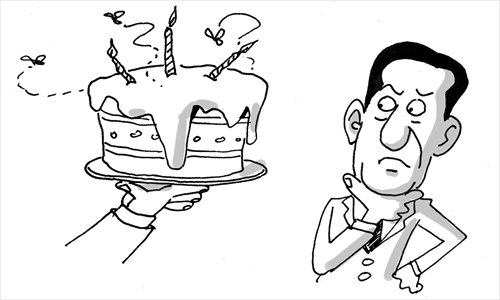Abe’s personal speech cannot alleviate concerns from international community

Illustration: Liu Rui/GT
Japanese Prime Minister Shinzo Abe announced recently his speech to mark the 70th anniversary of the end of WWII will not require a Cabinet approval, Japanese media reported. The statements made by former prime ministers Tomiichi Murayama and Junichiro Koizumi for the 50th and the 60th anniversaries were approved by the Cabinet, and therefore were considered to be the voices of the government. If Abe's speech this summer is his personal opinion without Cabinet approval, then it will carry less weight than Abe's predecessors' speeches.
If the statement is published as Abe's individual opinion and the role of the government is weakened, it will be seen as showing some consideration to countries invaded by Japan, and at the same time will avoid possible damage to the coalition system by the Liberal Democratic Party and New Komeito. Nonetheless, Abe will deliver his speech as Japanese prime minister. Considering this, the talk may trigger misgivings from international society.
Abe should seek Cabinet approval before delivering his statement. Besides, what deserves more attention is the content of Abe's speech.
Abe has long been reluctant to use terms such as "apology" and "colonial rule and aggression" which were used in the previous statements. He argued that there would be no need to deliver the speech if the content is the same as previous ones.
Before his visit to Germany, Abe refused to follow Germany in apologizing for Japan's wartime past during an interview with the Frankfurter Allgemeine Zeitung in late April. He claimed that the post-WWII history of Europe and Asia are completely different. Abe also refused to recognize the rule of the Potsdam Declaration when speaking at a Diet debate between Japanese political parties on May 20.
In a survey carried out in late April by Japan's Kyodo News, more than half of the respondents said Abe's speech should include "reflection and apology" for "colonial rule and aggression." If Abe still chooses to ignore this issue and utter vague words about Japan's wartime past, he will only hurt the feelings of neighboring countries and fuel conflict. This will also become a bottleneck impeding reconciliation between Japan and its neighbors in the long run.
As the 70th anniversary of the end of WWII, this year provides a great chance for Japan to face up to history. Abe should seize the opportunity to voice the right attitude toward the past.
For East Asian countries, self-reflection is an important component of their culture. Neighboring countries' worries that Japan may repeat past mistakes are justified if Japan refuses to reflect on its actions.
Although the Japanese government has apologized in the previous statements, the Abe Cabinet, representing Japan, has the responsibility to make continuous efforts to face up to history during the 70th anniversary. It should also encourage the next generation to reflect on the war.
Joint efforts from all sides are essential to promote reconciliation between Japan and adjacent countries. The reconciliation does not count until Japan is forgiven by the citizens of invaded countries.
The author is a professor at the School of International Studies at Yunnan University. opinion@globaltimes.com.cn